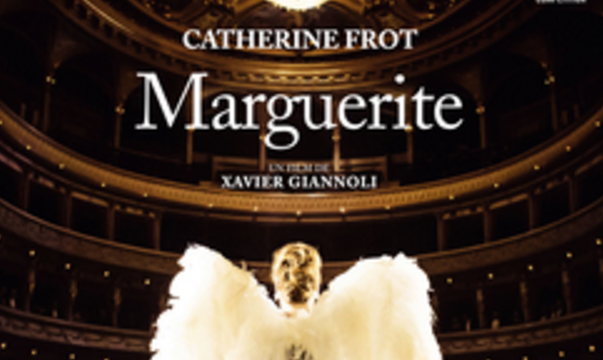In his sixth feature film, “Marguerite,” French director, writer and producer Xavier Giannoli creates a story that toes the line between comedy and tragedy despite its imperfections.
Loosely inspired by the life of amateur operatic soprano Florence Foster Jenkins, the film stars ten-time César Award nominee Catherine Frot as Marguerite Dumont, a patron of the arts whose fanatical love of opera is surpassed by her complete lack of talent. Her husband Georges (André Marcon) and butler Madelbos (Denis Mpunga) do everything they can to conceal the truth, from clipping negative reviews to ordering crushing floral arrangements from so-called admirers.
When cynical journalist Lucien Beaumont (Sylvain Dieuaide) writes an ambiguous review lauding her attempts to “[exorcise] an inner demon,” Dumont decides the time has come to put on a public performance. However, as she prepares for the biggest night of her career, those closest to her struggle to keep the lie they have carefully cultivated for years from being exposed.
Since her death in 1944, Dumont’s real-life model has lived on in the form of novelty records capturing her unbearable shrieks and stage plays reducing her to the butt of a cruel joke that everyone got but her. Giannoli takes a different approach by bringing out the songstress’ human side, allowing viewers to laugh at her peacock-like squawking while simultaneously reminding them that her intentions are pure, and her heart is in the right place.
The true beauty of this film, however, lies in the portrayal of Dumont herself. Best known for her roles in “Family Resemblances” and “The Dilettante,” Frot captures the titular heroine’s inner sadness with such elegance and grace that she transforms what could have been a comic representation of the opera singer into something much more poignant. Everything her character does, whether it involves practicing scales or channeling an iconic aria, is done with a definite vulnerability, and there are no words to describe the multitude of feelings that emerge when she opens her mouth to sing.
Marcon is in good force, crafting a performance that successfully establishes the kind of person Georges is: committed to protecting his wife from public ridicule, but unable to bring himself to tell her the truth.
Mpunga equally shines as the hulking yet devoted Madelbos, whose devotion to his mistress recalls Max von Mayerling in “Sunset Boulevard,” while Michel Fau nearly steals the show as a washed-up tenor who acts as Dumont’s vocal coach and subjects her to a series of exercises that range from singing into a wall to rubbing her breasts.
While Dieuaide does a magnificent job portraying the foppish Lucien and keeps the plot going, he is left with little else to do besides awkwardly wooing Hazel (Christa Théret), a promising young soprano who has all the talent Dumont lacks, but is only seen in the opening sequence and the final act. This could have been easily remedied had Giannoli chosen to avoid the need to include a romantic subplot, which would provide an opening for character development and create an excuse for a “rivalry” between Dumont and Hazel.
The biggest issue is that the ending devolves into an entirely different film and leaves the audience disappointed as to the explanation behind the questions that viewers will eventually ask: What is it that drives Dumont to sing? What is she trying to accomplish? If she knows that she sings so cacophonously, why does she do it?
Despite its flaws, “Marguerite” is a masterful blend of acting and filmmaking that will make you want to do exactly what the trailer asks you to do: cover your ears and open your heart.




